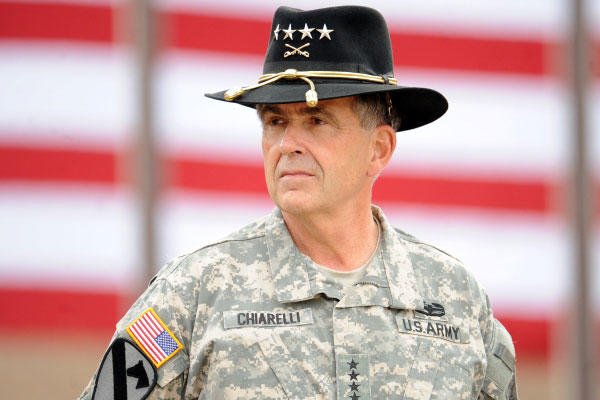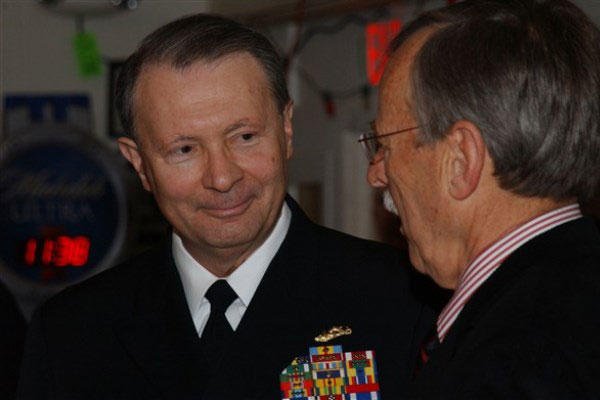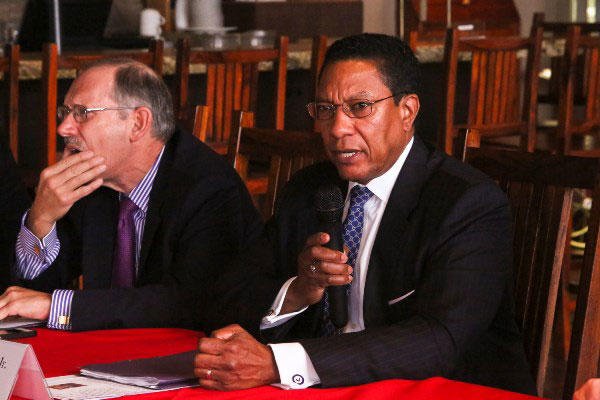One is a Medal of Honor recipient. Another is the first Vietnam veteran elected to the Senate. And another is a retired general who fought to protect troops from roadside bombs in Iraq and suicides back home.
All but one of the nine members of the blue-ribbon Military Compensation and Retirement Modernization Commission has served or is currently serving in the U.S. military.
This collective experience was highlighted in recent congressional testimony about the panel's recommendations to overhaul military benefits. They include offering troops 401(k)-like retirement plans and families a choice of commercial health insurance plans in lieu of the Tricare program, along with other proposals designed to give them more choices while saving the Pentagon an estimated $12 billion a year by 2040.
"It should not be lost on the committee that of the five commissioners [testifying] … all of us have had military service," Commissioner Stephen Buyer told lawmakers. "We're military retirees. We've served this nation in war and in peace."
Here's a biographic sketch of the commissioners, who were appointed in 2013 by congressional leaders and President Barack Obama. Their 15 recommendations, released last month after nearly two years of review, promise to dominate the debate in coming weeks and months, possibly even years, over the future of military compensation.
The Money Man: Chairman Alphonso Maldon
A former Army officer who rose to become an assistant secretary of defense, Maldon also led the charge to bring professional baseball back to Washington, D.C. With his own consulting company and experience as an executive at PNC bank, he managed a group of investors in bidding for Major League Baseball's Washington Nationals team. He was commissioned in the service in 1972 and completed tours of duty in Southeast Asia and elsewhere. He served as a special assistant to President Bill Clinton and as an assistant secretary of defense for Force Management and Policy. He was appointed to the panel by Obama and, as chairman, quarterbacks the commissioners' appearances before Congress.
The Congressman: Stephen Buyer
Buyer is a former Republican congressman from Indiana who spent almost two decades in the House of Representatives. He headed the Veterans Affairs Committee and served on the House Armed Services Committee. He helped create the Tricare for Life health care program for elderly retirees and redesign the military's pharmacy system. As a judge advocate general in the Army Reserve, he worked with commanders to interrogate Iraqi prisoners during the first Gulf War and retired as a colonel. He has also lobbied for McKesson Corp., the San Francisco-based health services company. He was named to the commission by Senate Majority Leader Mitch McConnell, R-Kentucky.
The Staffer: Michael Higgins
Higgins spent more than two decades as a professional staff member on the House Armed Services Committee – after spending almost as long in the Air Force. His wonkishness extends to all areas of military human resources policy, from pay and retirement, to recruiting and retention, to health care and even child care. He came to Capitol Hill after retiring from the Air Force as a lieutenant colonel. Over two decades in the service, he worked for the Office of the Secretary of the Air Force, Military Personnel Center and in other assignments. He was appointed to the panel by House Speaker John Boehner, R-Ohio.
The General: Peter Chiarelli
Chiarelli served almost four decades in the Army and retired as the service's vice chief of staff, the second-highest ranking officer. He commanded troops in Iraq. He oversaw the 1st Cavalry Division, which was responsible for securing Baghdad. He later served as the operational commander of all forces in the country as head of Multi-National Corps-Iraq. He -- arguably more than any other military leader -- has tried to raise public awareness about the plight of suicides in the ranks, as well as the high number of veterans struggling with post-traumatic stress disorder, or PTSD, and traumatic brain injury, or TBI. He was named to the commission by House Minority Leader Nancy Pelosi, D-California.
The Admiral: Edmund Giambastiani
A Naval Academy graduate from a small town in upstate New York, Giambastiani climbed the ranks to become the nation's second-highest ranking military officer, the vice chairman of the Joint Chiefs of Staff. A submariner who served on the USS Puffer and other vessels, he later commanded Atlantic Fleet Submarine Force, Joint Forces Command and other units. In the private sector, he's served as a board member for several companies, including Military.com's parent company Monster Worldwide Inc. He was appointed to the panel by McConnell and recently warned that Tricare was "in a death spiral" -- a claim that some beneficiaries dispute.
The War Hero: Robert Kerrey
A military commando-turned-politico, Kerrey was the first Navy SEAL to receive the Medal of Honor. On March 14, 1969, he led his teammates in scaling a 350-foot-cliff on a surprise attack against the Vietcong and was injured from a grenade that exploded near his feet. After the war, he got into politics. He was elected governor of Nebraska and later represented the state in the Senate. He lost the 1992 Democratic presidential nomination to Bill Clinton. He was recently president of the New School in New York City and now works as a consultant for The Carmen Group. He was named to the commission by Senate Minority Leader Harry Reid, D-Nevada, and has argued it would be wrong to balance the budget "on the backs of our military retirees."
The Soldier Scholar: Larry Pressler
A lawyer by training, Pressler was the first Vietnam veteran elected to the U.S. Senate. A decorated Army officer who served two tours of combat, he also got into politics after the war. He represented South Dakota as a Republican in the House and later the Senate. During the 2014 mid-term elections, he changed his political affiliation to Independent and made an unsuccessful run to win back his old Senate seat. He has served on the visitor boards for the U.S. Military Academy and the Air Force Academy. He has also worked to create shelters for homeless veterans in the Bronx and Harlem. He has degrees from Harvard Law School, Oxford University and other institutions. He was appointed to the panel by Reid.
The Drone Commander: Christopher Carney
Carney, a Navy reservist and former Democratic congressman from Pennsylvania, has a favorite line when testifying before lawmakers about his difficulty in finding health care providers in the Tricare network: "As a reservist who did not have good access to Tricare, it wasn't called Tricare for us. It was called try-to-find care." He was commissioned in 1995 and has worked stints at the Defense Department. He's now a combat mission operation commander for medium- and high-altitude drones, including the MQ-1 Predator, MQ-9 Reaper and RQ-4 Global Hawk. He's also a political science guru and was a professor at Penn State University. He was named to the commission by Pelosi.
The Civilian: Dov Zakheim
The lone civilian on the commission, Zakheim is a big name in defense circles in Washington, D.C., with extensive experience in high-profile posts at the Pentagon. He was the Pentagon's comptroller and chief financial officer during the George W. Bush administration. He also coordinated civilian programs in Afghanistan. He's worked in the private sector in leadership positions at SPC International Corp. and Booz Allen Hamilton. He's currently a senior adviser at the Center for Strategic and International Studies, a think tank in Washington, D.C. He was appointed to the panel by Boehner and has pushed to give the services greater flexibility in offering bonuses to shape the force.
-- Brendan McGarry can be reached at Brendan.McGarry@military.com.






























